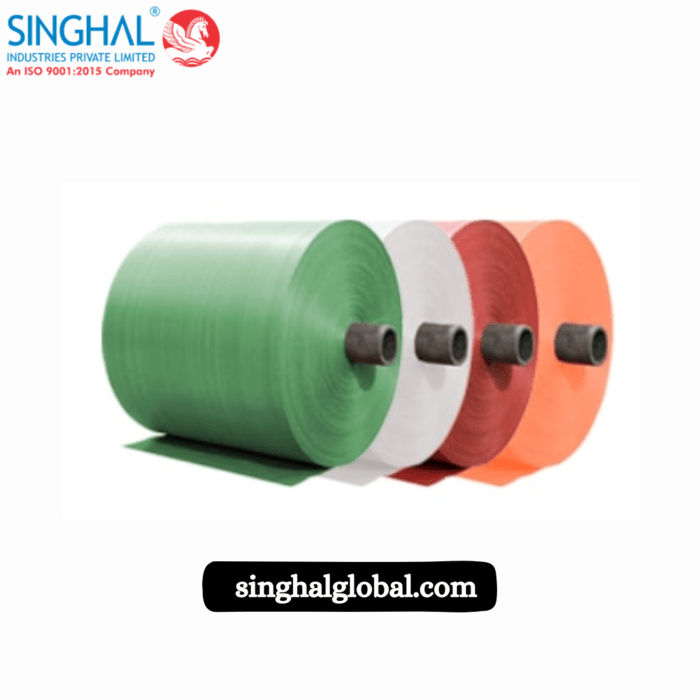For centuries, textiles have played a vital role in human progress. From basic clothing to complex industrial applications, fabrics have evolved alongside our needs. In the modern industrial landscape, one material stands out for its exceptional versatility and resilience: polypropylene (PP) woven fabric. Moving beyond the limitations of individual fibers, PP woven fabric offers a unique combination of properties that make it an indispensable material across various industries.
Understanding PP Woven Fabric
PP woven fabric is a textile constructed by interlacing threads composed of polypropylene, a synthetic thermoplastic polymer. The weaving process creates a strong, stable structure that offers superior performance compared to individual PP fibers. This process allows for customization of the fabric’s weight, strength, and porosity based on the specific application.
Key Characteristics of PP Woven Fabric
Several key characteristics make PP woven fabric a preferred choice in industrial applications:
1. Strength and Durability: The inherent strength of polypropylene fibers translates to exceptional durability in PP woven fabrics. These fabrics can withstand significant wear and tear, making them ideal for demanding environments.
2. Moisture Resistance: Polypropylene is naturally hydrophobic, meaning it repels water. This property makes PP woven fabrics ideal for applications where moisture protection is crucial, such as packaging and construction.
3. Chemical Resistance: PP woven fabrics boast impressive chemical resistance. They are unaffected by most common chemicals and solvents, making them suitable for use in environments with harsh conditions.
4. Lightweight: Despite its strength, PP woven fabric remains surprisingly lightweight. This characteristic translates to easier handling, transportation, and application in various settings.
5. Cost-Effective: Compared to other industrial fabrics, PP woven fabrics offer a cost-effective solution. This affordability makes them a practical choice for a wide range of applications.
Applications of PP Woven Fabric
The unique combination of properties possessed by PP woven fabric has led to its adoption in a diverse range of industrial sectors:
1. Packaging: PP woven fabric rolls are widely used in the packaging industry. Their strength, moisture resistance, and lightweight nature make them ideal for creating sacks, bags, and bulk packaging for various products.
2. Construction: PP woven fabrics find numerous applications in construction. They are used as geotextiles for soil stabilization, erosion control, and drainage. Additionally, they serve as vapor barriers and concrete curing blankets.
3. Agriculture: In the agricultural sector, PP woven fabrics are used for crop covers, shade sails, and weed control mats. Their durability and weather resistance make them well-suited for protecting crops and promoting healthy growth.
4. Automotive: The automotive industry utilizes PP woven fabrics for various purposes, including seat covers, interior components, and underbody protection. Their lightweight nature and resistance to abrasion make them a valuable asset.
5. Medical and Hygiene: PP woven fabrics are used in the production of medical gowns, surgical drapes, and disposable wipes due to their hygiene properties and ability to resist moisture and some chemicals.
PP Woven Fabric vs. PP Non-Woven Fabric
While both PP woven and non-woven fabrics are derived from polypropylene, they differ significantly in their construction and properties. PP non-woven fabrics are created by bonding polypropylene fibers together through heat, pressure, or chemical adhesives. This process results in a more flexible and lightweight material, but with less strength and tear resistance compared to woven fabrics.
Choosing the Right PP Woven Fabric Manufacturer
Selecting a reputable PP woven fabric manufacturer is crucial for ensuring the quality and performance of the final product. Here are some key factors to consider:
1. Experience and Expertise: Choose a manufacturer with a proven track record and extensive experience in producing PP woven fabrics.
2. Product Variety: Look for a manufacturer who offers a wide range of PP woven fabrics with varying weights, strengths, and treatments to meet your specific needs.
3. Quality Control: Ensure the manufacturer has a robust quality control system in place to guarantee consistent product quality.
4. Customization Capabilities: If your application requires a unique fabric configuration, choose a manufacturer with the ability to customize the weaving process and fabric properties.
5. Sustainability: Consider a manufacturer committed to sustainable practices, such as using recycled polypropylene or implementing eco-friendly production processes.
Conclusion
PP woven fabric has emerged as a game-changer in the industrial sector. Its unique blend of strength, durability, moisture resistance, chemical resistance, lightweight nature, and cost-effectiveness makes it an indispensable material for a wide range of applications. From packaging and construction to agriculture, automotive, and medical fields, PP woven fabric offers a reliable and versatile solution. As technology continues to evolve, we can expect further advancements in PP woven fabric properties and manufacturing processes, leading to even more innovative and sustainable applications in the years to come.
FAQs (Frequently asked questions)
Q1. What is the difference between a PP woven fabric roll and a bag?
A1. PP woven fabric roll is a large sheet of woven polypropylene fabric. This roll can be cut and sewn into various bags and other products based on specific requirements.
Q2. Can PP woven fabrics be recycled?
A2. Yes, PP woven fabrics are recyclable. Look for manufacturers who offer recycled content options or have recycling programs in place.
Q3. How long do PP woven fabrics last?
A3. The lifespan of PP woven fabrics depends on various factors, including fabric weight, exposure to UV rays, and usage conditions. However, they generally offer extended durability compared to other fabrics.


